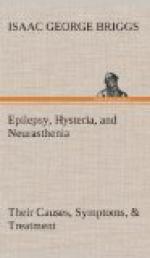Meals should be ready at regular hours, and capricious appetites should freely be humoured among suitable foods, served in appetizing form to tempt the palate. Let them chatter, but see they do not get the time to talk by bolting their food.
Most children can chew properly soon after they are two, but they are never taught. Their food is “mushy”, or is carefully cut, and gives them no incentive to masticate. So long as food is digestible, the harder it is the better, and plain biscuits, raw fruits, and foods like “Grape Nuts”, are splendid. Mastication helps digestion; it also prevents nasal troubles.
The desire for food at odd moments causes trouble, which is aggravated if the meals are not ready at stated hours. Gently but firmly refuse the piece of bread-and-butter they crave, explain why you do so, and though they weep, or fly into a passion, do not lose your own temper, or beat, or give way to them. When accustomed to regular hours and firm refusals they will not crave for titbits between meals.
It is very hard for them to see other members of the family freely partaking of condiments, drinks and unsuitable foods, and be told they are the only ones who must refrain. A little personal self-sacrifice helps immensely, and if your child must refrain so might you.
All foods must be pure. Avoid tinned goods, and cheap jams, which contain mangels and glucose. Judged by the nutriment they contain—most cheap foods are very expensive.
Lightly boil, poach, or scramble eggs; steam fish and vegetables; cook rice and sago in the oven for three hours. See that milk puddings are chewed, for usually they are bolted more quickly than anything else. The stomach is expected to deal with unchewed rice pudding, because it is “nourishing”. So are walnuts, but you do not swallow them whole.
Fruit must be fresh, ripe and raw, with skin and core removed. Brown bread, crisply toasted and buttered when cold, is best. Porridge is admirable, but many children dislike it. Try to induce a taste by giving plenty of milk, and sugar or syrup with it.
The starch-digesting ferments in the saliva and pancreas are not active until the age of 18 months, before which infants must not be given starchy foods like potatoes, cereals, puddings and bread.
All greenstuffs must be thoroughly washed, or worms may pass into the system. Foul breath, picking the nose, restlessness, fever and startings are often attributed to worms, when the real “worms” are mince pies, raisins, sour apples, and even beer.
Never force fat on children in a form they do not like, for there are plenty of palatable fats, as butter, dripping, lard and milk. Cream is as cheap, as good, and far nicer than cod-liver oil.
Decide on your children’s diet, but do not discuss it with or before them. If a child does dislike a dish, never force it on him, but try to induce a liking by serving it in a more appetizing way. Never mix medicines with food.




